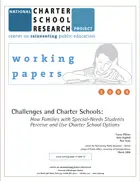This report addresses choices made at the intersection of two very important trends in education: special education and charter schools. Advocates of school choice contend that the diversity of the student population requires a diversity of schools to allow parents to select the right “fit” for their children. Students with special needs are at the far margins of diversity, and their needs by definition are above and beyond those of their more typical peers. In both school choice theoretical frameworks and special education legal frameworks, it is intended that parents are full partners and advocates for their children in making educational choices. The responsibility of the family for making positive choices is thus magnified when families of students with special needs consider a range of school choices, including charter schools.
This study used results from six focus groups in two cities with extensive school choice and charter school experience: Denver and Milwaukee. Focus group results were supplemented by the results of over 200 surveys submitted by self-selected respondents, mainly parents of students with special needs attending charter schools.
Put simply, the school choice process can be more complex for parents of special needs children. It is difficult to generalize about what these parents are looking for in a school, because what they are looking for is whatever their child needs in a school, which varies widely from child to child. The same may be said of typical children, but it is more so for these special needs children. These children are fragile, whether physically, intellectually, or socially. Their parents feel very keenly the responsibility to make sure these children are safe and cared for.






